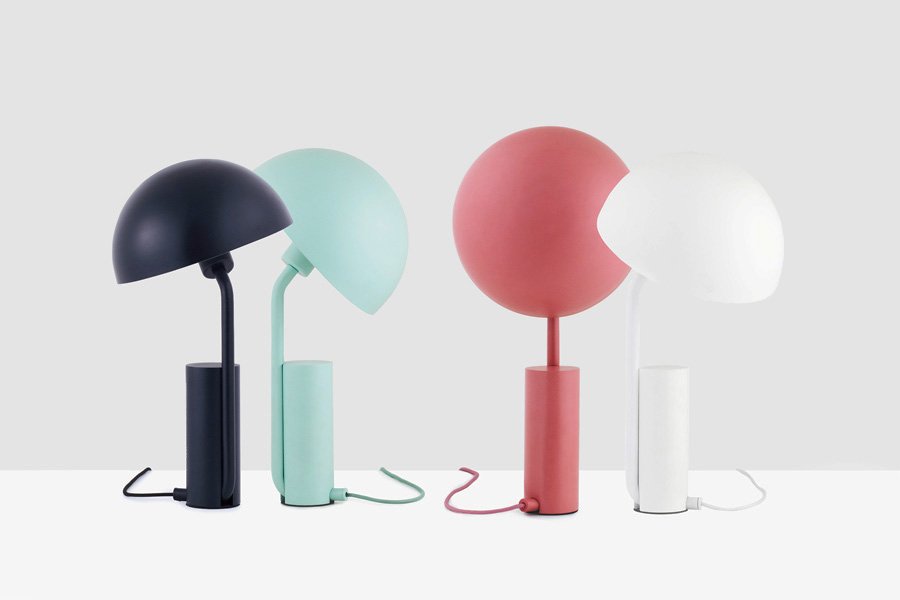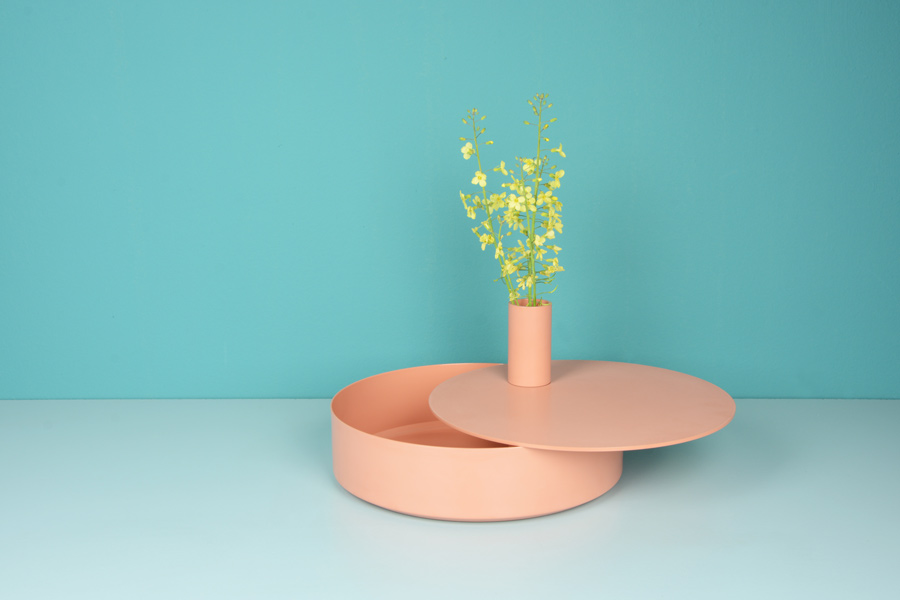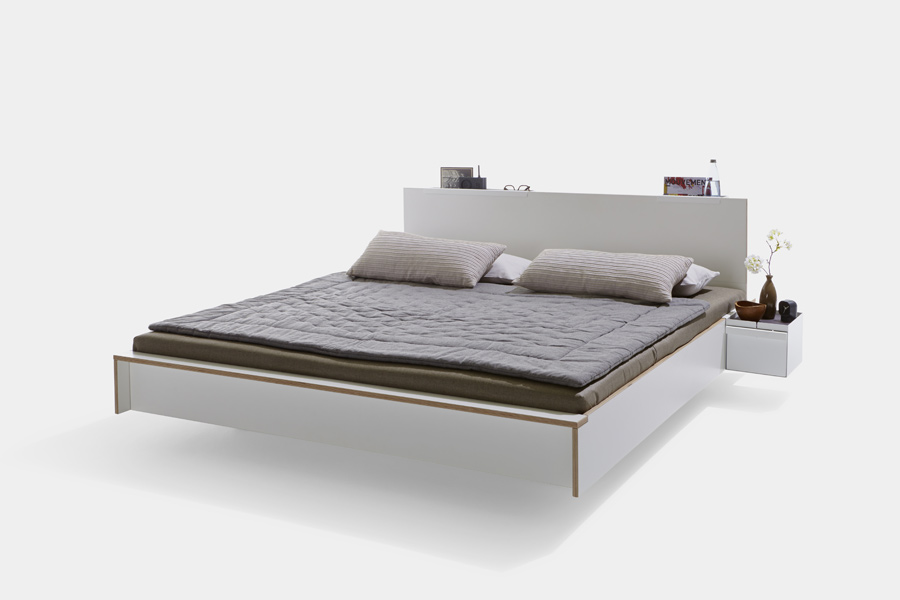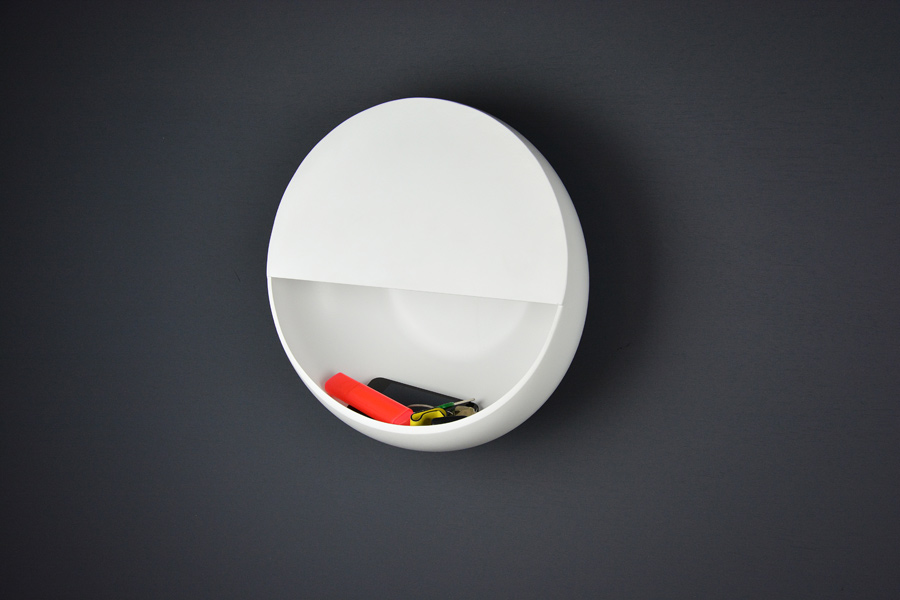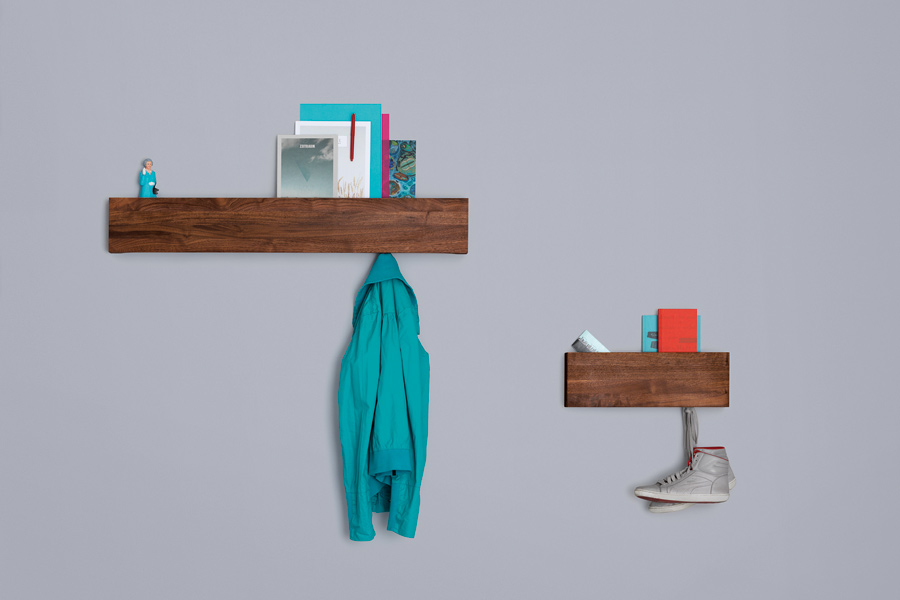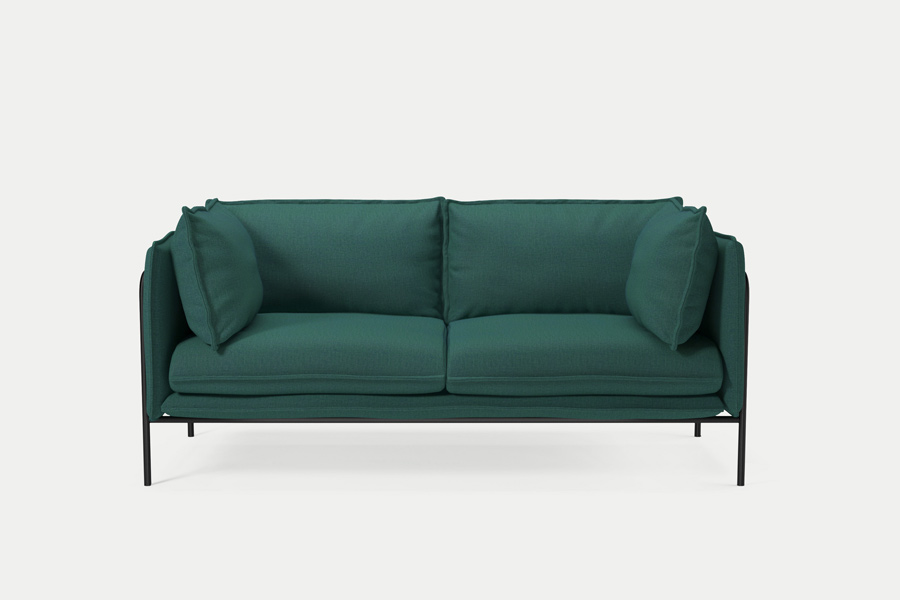We first became aware of Florian Kallus and Sebastian Schneider a.k.a design studio kaschkasch before they were kaschkasch, when they were just Akademie für Gestaltung Münster students Florian Kallus and Sebastian Schneider. Our first contact with Florian was when we saw his project "Table & Lamp" at DMY Berlin 2010. Nothing more complicated than a table, or technically a desk, with a freely positionable and directable lamp attachment, "Table & Lamp" is and was one of those projects that impresses through its self-effacing obviousness and the attention to detail in the realisation. For various reasons "Table & Lamp" regrettably didn't appear in these pages, unlike Sebastian's “Franzel” garden table and bench project which we saw at IMM Cologne 2011 and which features just the most deliciously well thought through folding leg mechanism. A piece of inspired and competent design thinking we rewarded, as only we can, with one of the worst photos we've ever taken. Ever.
Florian and Sebastian graduated in 2011 and subsequently moved to Cologne where they established kaschkasch in a former saddlery in the pleasingly unhip Zollstock district of the city and from where they have realised furniture and lighting design projects for international manufacturers as varied as, amongst others, Zeitraum, Normann Copenhagen, Bolia or Müller Möbelwerkstätten.
We met up with Florian Kallus to discuss the pros and cons of Cologne, the realities of life as a young designer, and what is a "kaschkasch", but began as ever by asking, why design?
Florian Kallus: Both Sebastian and myself initially completed carpentry apprenticeships, and in my case it was so that through the apprenticeship an interest in furniture and interiors developed, and in particular a fascination for aesthetics, function and the interplay between the two and so subsequently I decided to study product design.
smow blog: You and Sebastian met at the Akademie für Gestaltung in Münster, was it a case that you hit it off immediately and regularly cooperated on projects, or......?
Florian Kallus: At college we were friends, but it wasn't that we were always cooperating, we generally both did our own thing, however in addition to connecting on a personal level we always had an appreciation for and interest in each others work. And then, largely because we both wanted to establish our own studios, we completed a joint graduation project in context of which we developed five products and also a company to market them, complete with business plan, and even a name, "kaschkasch". From those five objects Magazin subsequently took two into production and thus the decision to continue professionally as kaschkasch was fairly straight forward.....
smow blog: And the decision to base yourselves in Cologne, was that equally as straight forward?
Florian Kallus: Much as we both enjoyed our time in Münster, having graduated we were both in need of a change of location. At that time we only saw Cologne, Hamburg or Berlin as realistic options for establishing a design studio. With Hamburg we didn't know anyone, had no connection with city, and while Berlin in many respects would have been the easy decision, we felt that geographically one is a little isolated, and so ultimately Cologne made more sense because you are very central, can quickly travel anywhere, and in addition we had personal connections with the area which isn't unimportant.
smow blog: And was it in retrospect also the correct decision, is Cologne a good city to be based as a designer?
Florian Kallus: For us Cologne has proven to be an excellent location. On the one hand you have an awful lot of industry, also in the near vicinity when you consider the Ruhrgebiet as a whole, in addition, and what I particularly appreciate about Cologne is the mentality, the openness, of the people here. When we first arrived it was very noticeable that we were greeted everywhere with a genuine openness. As a general rule when as a designer you approach a craftsman or trades workshop to discuss a project you are initially treated very critically, if not plain distrusted, here in Cologne everyone was not only very open but also wanted to cooperate with us. In addition the general atmosphere in Cologne is such that one has an awful lot of freedom.
smow blog: Which we take to mean that you have established a good network of competent partners with whom you can cooperate when developing projects?
Florian Kallus: Exactly. Round the corner from our studio, for example, is a carpenter who either produces small elements for us or lets us use his workshop, which again is this openness one experiences here, then over in Ehrenfeld we have a metalworker who not only produces prototypes and elements for us but also helps and advises on the technical aspects, and that is super when you have someone who not only works with you but who enjoys working on your projects and is committed. And we both appreciate that an awful lot.
smow blog: But is Cologne affordable, is their sufficient studio and workshop space available?
Florian Kallus: There is space available, but in general the property market in Cologne is very hard fought, be that for flats, workshops, ateliers, whatever, it is currently very difficult to find anything suitable and affordable. That we found our space here and that it has proven to be so suitable, was a genuine piece of good fortune.
smow blog: And externally do you feel Cologne is taken seriously by those outside the city, do you feel yourselves visible here, or is it the case that the furniture industry comes to Cologne every January for IMM and then focuses elsewhere for the rest of the year?
Florian Kallus: That is difficult to answer because we only know the situation here in Cologne. Internationally I don't believe that Cologne is understood as a design metropolis, partly because for many foreigners Germany is Berlin and for all German design is Berlin design. For example, in the past we have undertaken interviews with foreign media and they ask how is life as a Berlin designer, or how does it feel to live and work in Berlin, and we need to explain that we're not in Berlin, we're in Cologne, which they haven't always understood. However we've never experienced that as a problem and we certainly feel ourselves visible and taken seriously.
smow blog: Changing tact slightly, you've been working together as kaschkasch since 2011, have the past four years been as hard as you expected, or even harder.........?
Florian Kallus: At the beginning we genuinely imagined it would be a lot easier than it has proved to be, which probably isn't such a bad thing because if we had known how difficult it would be we might not have started! Sometimes a little naivety is good for the motivation. A particular problem has proven to be the license system by which designers are paid, as it means it can easily be two years from finishing a draft until receiving the first cheque, which on a practical level means we are only now in a position where we are genuinely earning money from the licences, and that after a little over four years in business. There are individuals who have the good fortune to start their careers with one successful product with which they can cover all their running costs, but those are exceptions and for the majority it is a long hard path. And the majority of those starting out don't realise how hard, or how long.
smow blog: And for those who don't have the one big seller the alternative is, we presume, and much like yourselves, to try to have numerous products with a wide range of manufacturers which together ensure a regular cashflow?
Florian Kallus: Most definitely, the difficulty however is to get to that stage. I always like to compare it to a motor mechanic establishing their own garage. When you first start and have never had a customer it is very difficult to win your first customer, but that first customer then helps you win more customers. In effect the products that we currently have are that difficult first customer and now having won the first customer we've become visible, have a reputation, and while the second and third customers are by no means easy, they are easier.
smow blog: As you say the difficulty is attracting that first customer, in that context, as a young designer do, for example, trade fairs help, or........?
Florian Kallus: I think so, yes. In the first three years we did everything imaginable. We were in Milan three years running and also in Cologne, Frankfurt, Paris, New York, everywhere, doing so four or five trade fairs per year, which obviously costs an awful lot of money; however, from these fairs we managed to secure the first contracts. For example the lamp Cap for Normann Copenhagen or the mirror for Menu came directly from fairs and are now central projects in our portfolio. Or we have recently released the Fju wall mounted desk with Living Divani, that was a project which they first saw at Salone Satellite, and achieving such a result is very difficult when you start by telephoning or sending an email.
smow blog: And press coverage, is that something that is helpful as a young designer, can press coverage help attract a producers attention?
Florian Kallus: If I'm being completely honest, in the beginning you do such because you believe it will bring something, but personally I believe it brings very little. In the past four years there has only been one single occasion in which a manufacturer has contacted us because of something they saw in the press! For me press coverage only starts to make sense when you have products on the market, where you are promoting products that people can actually buy. In addition we've recently understood that many producers aren't that interested in a prototype that looks good in a magazine or online platform, but rather in a product that you have in production with another company; because that demonstrates that you understand what you are doing, understand the process and are capable of seeing a project through from prototype to market launch and promotion. Which is again similar with the garage: once someone sees that we can, figuratively speaking, repair a car then they are more confident about working with us.
smow blog: Working with producers means working a lot more to a producer's brief, once you start working more to brief does that then change how you work?
Florian Kallus: It does change a little, that is something we've definitely noticed. On the one hand there is a little more stress because you have a lot more deadlines, and then although the briefs are generally not that specific you do have to work within the processes, abilities, price structures, and often preferred materials, of the client. However on the other hand it is much more agreeable to work on a brief because then there is a realistic chance that something will arise, rather than designing something and then trying, hoping, to place it with a producer.
smow blog: And the internal kaschkasch processes, have they also changed, so who does what and how you develop a project?
Florian Kallus: I would say it is more the case that we have increasingly found our niches within the studio rather than anything having changed. Sebastian is more the technician and is primarily responsible, for example, for creating the 3D drawings while I am more concerned with the overall concept and the aesthetics of the piece. However what hasn't changed is that we both develop ideas individually and then present them to the other, discuss them critically and only proceed with a project when are both fully convinced by it.
smow blog: Briefly to end and looking to the future, are you planning staying in Cologne and staying with furniture design?
Florian Kallus: For the time being the plan is definitely to remain in Cologne and also to maintain a primary focus on furniture, not least because we have developed a large degree of experience and expertise in and with furniture. What however is currently very motivating and where we are looking to do much more is lighting design. Lighting is a huge subject and a fascinating market where there is currently so much and such rapid development that for us as designers it is very alluring, and so we are currently working on developing numerous lighting projects and are keen to move further in that direction.
smow blog: And to end, it technically probably should have been the first question, but the name, why "kaschkasch", is it some sort of play on "cash" or "cache" or....?
Florian Kallus: No, no its simply from our surnames KAllus and SCHneider...... nothing more complicated than that, but is also a word that people tend to remember which in the furniture industry is very useful!
More details on kaschkasch and their work can be found at http://kaschkasch.com
